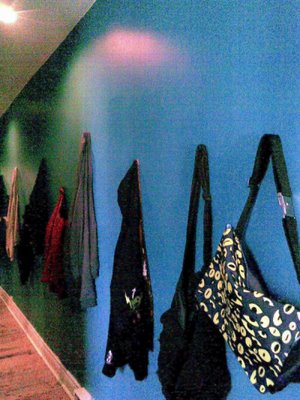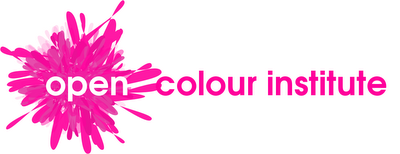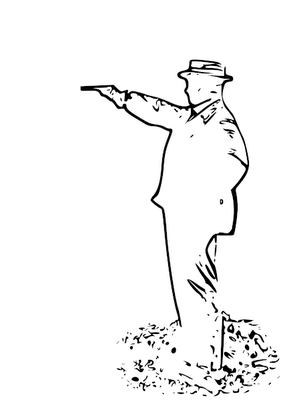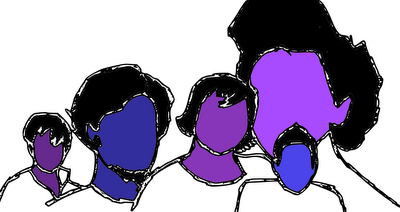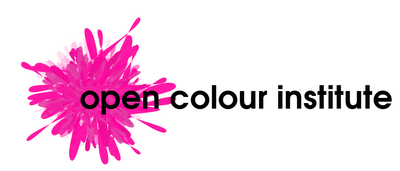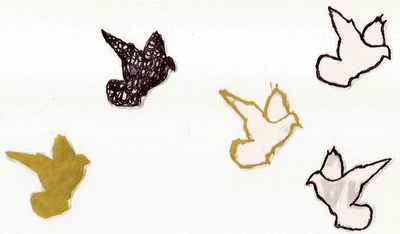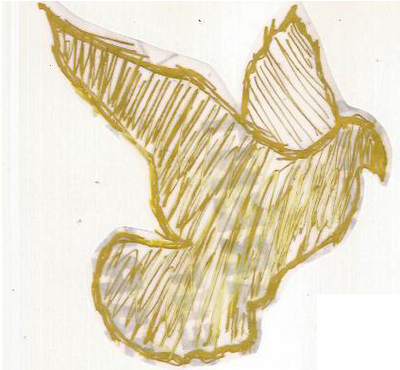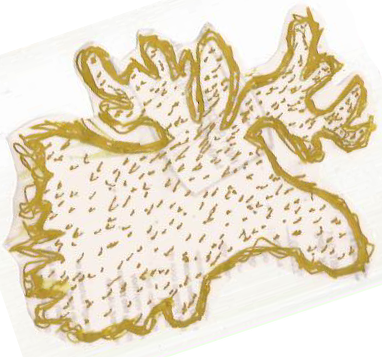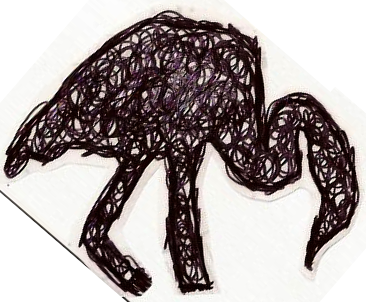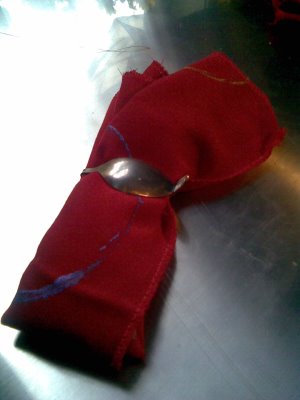October 2008 Archives
People try to be too damn reasonable and realistic about the future. I think those are silly and impossible things to be. Everything always changes. How can we expect to be reasonable about the unknown? I don't care if the world will always need engineers and lawyers and accountants. I don't want to be something the world will always needs. Where's the fun in that? I'd much rather be something new.
Assumptions: Food is a necessity. Without food, human beings can't live. Most people do not have easy access to farmer's markets or community shared agriculture schemes. Most North Americans shop in supermarkets.
Observations: It's impossible to look anywhere in a grocery store without seeing invasive brand messages. Okay, that last sentence was a tiny exaggeration. The ceiling is almost always free of brand messages and in most cases, so is the floor. The remainder, on the other hand, is generally quite thoroughly visually cluttered.
Solution: There needs to be a completely unbranded grocery store. I don't mean that there needs to be a store that sells only their own brand of food. I mean packaged goods in the unbranded store need to be blank except for the name of the food, the country of provenance, the nutritional information and the ingredients.
Think: Many of the necessary foods can already be found brand-free. Vegetables and fruits, more often than not, aren't branded (although there seems to be a trend towards branding them). Some stores have bulk sections which allow for the purchase of ingredients like flour that aren't branded.
Implementation: The unbranded grocery store needs to take advantage of the existing private label infrastructure. In the same way that Loblaw has food sold under its own name, the unbranded grocery store can implement a private label brand. The only difference is that this brand isn't a brand. It is instead the complete absence of a brand. Of course, it also makes a kind of good business sense to stock a store entirely with private label products. Margins are higher on private label than on national brands and prices can be lower.
Of course, the store would be a promotional disaster. Many consumers take comfort in familiar brands. A store that offered a reprieve from visual noise might not be widely welcomed, even if the prices were lower. But, just at this moment, having grown tired of too much visual clutter in supermarkets, I'd jump at the chance to shop at an unbranded grocery store.
Observations: It's impossible to look anywhere in a grocery store without seeing invasive brand messages. Okay, that last sentence was a tiny exaggeration. The ceiling is almost always free of brand messages and in most cases, so is the floor. The remainder, on the other hand, is generally quite thoroughly visually cluttered.
Solution: There needs to be a completely unbranded grocery store. I don't mean that there needs to be a store that sells only their own brand of food. I mean packaged goods in the unbranded store need to be blank except for the name of the food, the country of provenance, the nutritional information and the ingredients.
Think: Many of the necessary foods can already be found brand-free. Vegetables and fruits, more often than not, aren't branded (although there seems to be a trend towards branding them). Some stores have bulk sections which allow for the purchase of ingredients like flour that aren't branded.
Implementation: The unbranded grocery store needs to take advantage of the existing private label infrastructure. In the same way that Loblaw has food sold under its own name, the unbranded grocery store can implement a private label brand. The only difference is that this brand isn't a brand. It is instead the complete absence of a brand. Of course, it also makes a kind of good business sense to stock a store entirely with private label products. Margins are higher on private label than on national brands and prices can be lower.
Of course, the store would be a promotional disaster. Many consumers take comfort in familiar brands. A store that offered a reprieve from visual noise might not be widely welcomed, even if the prices were lower. But, just at this moment, having grown tired of too much visual clutter in supermarkets, I'd jump at the chance to shop at an unbranded grocery store.
I'm working on a project right now called the Illustrated Cinderella. I'm using the original Grimm text and doing decoupage illustrations from public domain images. I'm hoping to get the project finished in the next month, in time for a debut at Expozine. In the interim, here are some of the things I'm working on.
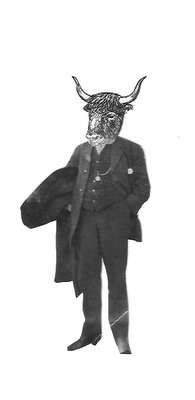
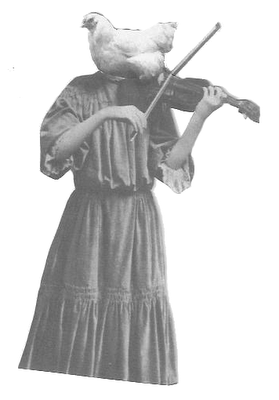


There's a half funny, half serious idea I've been kicking around for the last few months. It's called the SPCC, or the Society for the Prevention of Cruelty to Creatives. The idea is twofold:
Part one of the SPCC is a helpline for bored and abused creatives. You're a designer who gets stuck cropping and resizing all day? Call and talk it over. Copy writer stuck with unreasonable deadlines and unresponsive superiors? Call the helpline and strategize. This half of the idea is quite similar to Designphone, an idea I blogged about last March. The main difference is that it would have a mandate beyond just serving designers and would instead be there for creatives of all types. It's part two that gets interesting.
Part two is basically a home for bored and misused creatives. Essentially, it's a retreat for creatives who just can't take it anymore. It would essentially be a sanctuary full of free time, other creative people, and the resources necessary to carry out personal projects. Creatives would be able to come down for a break from the monotony of doing boring, not terribly creative, creative work. It would also offer workshop retreats for open-minded management who would either like to reward their creatives with a break or learn how to be a little more creative themselves. Naturally, corporate rates would be rather different from the rates charged to individual creatives. Proceeds from corporate retreats would go to funding project scholarships for creatives with ennui.
The Society for the Prevention of Cruelty to Creatives: like that SPCA, only instead of saving animals, supporting commercial artists of all kinds.
Part one of the SPCC is a helpline for bored and abused creatives. You're a designer who gets stuck cropping and resizing all day? Call and talk it over. Copy writer stuck with unreasonable deadlines and unresponsive superiors? Call the helpline and strategize. This half of the idea is quite similar to Designphone, an idea I blogged about last March. The main difference is that it would have a mandate beyond just serving designers and would instead be there for creatives of all types. It's part two that gets interesting.
Part two is basically a home for bored and misused creatives. Essentially, it's a retreat for creatives who just can't take it anymore. It would essentially be a sanctuary full of free time, other creative people, and the resources necessary to carry out personal projects. Creatives would be able to come down for a break from the monotony of doing boring, not terribly creative, creative work. It would also offer workshop retreats for open-minded management who would either like to reward their creatives with a break or learn how to be a little more creative themselves. Naturally, corporate rates would be rather different from the rates charged to individual creatives. Proceeds from corporate retreats would go to funding project scholarships for creatives with ennui.
The Society for the Prevention of Cruelty to Creatives: like that SPCA, only instead of saving animals, supporting commercial artists of all kinds.
While doing a little writing about traffic shaping and such things, it occurred to me that I don't know whether the name "Net Neutrality" actually qualifies as a proper noun. Many people treat it like a proper noun, capitalizing the first letter of each word, but there are also loads of people who don't. This inconsistency leaves me wondering whether it really should be a proper noun and some people are just being lax, or whether some people are just being overzealous with their capitalization. I've been hunting around to find out what exactly makes something a proper noun in English. According to the Wikipedia, a proper noun represents a unique entity. It then goes on to give examples like cities, the names of people, and specific physical things (like Bill of Rights, which may embody concepts, but has a physical manifestation all the same). But all of the things (not people, not cities, but things) mentioned are tangible. So, can movements and concepts be proper nouns? Net Neutrality isn't tangible. Is it allowed to be a proper noun? I'm thinking yes, given the capitalization of political ideologies and systems of thought. If Marxism and Liberal and Atheist can be proper nouns, surely so can Net Neutrality. I think, then, that I've answered my own question. Is Net Neutrality a proper noun? Yes.
I'd like to produce a range of tables with entertaining names and characteristics. The tables would have names like:
Uns
Irrisis
Indomi
Vege
Unsui
And so on... Do feel free to name more tables in the comments.
Uns
Irrisis
Indomi
Vege
Unsui
And so on... Do feel free to name more tables in the comments.
Idea: Make bookmarks out of cheap cutlery. Cheap stainless steel cutlery is thin and easy to manipulate. Just hammer the curves out of a fork or spoon and you have a handy, awesome bookmark. Pictures when I make one.
[Having discussed the idea of mission statements for people, I set about figuring out what I need to remember when times get confusing. The result is the following point form manifesto. I'm posting it because I think several of the points are useful, not just for me, but for anyone else of a similar age and inclination.]
- I will do things that interest me, come hell or high water
- I understand that interesting things are sometimes accompanied by boring things. I will find joy in the boring things because they help with the progress of the interesting ones.
- I must understand that degrees are only pieces of paper and that they may not make me happy or help me along with the things I want to do.
- I will remember that there are twenty million (give or take) different ways to do the same thing.
- I must remember to do things because they make me happy, not because I think I'm supposed to do them.
- I will avoid sulking and stewing and hiding under the covers when I am unhappy. Instead, I will endeavour to take positive action.
- I will not compare myself to other people. Everyone is different. That's the whole point. There's no reason to try to be the same as anyone else.
- I will not seek easy answers from outside sources. They don't exist.
- I must remember that most people do not achieve greatness before the age of twenty or even in their twenties. The people who do so are anomalies. I am not running behind schedule.
- I measure my own success. People who try to measure my success for me are wasting their time and neglecting themselves.
- The same goes for me: I have no right or time to measure the success of others. In short: I mustn't be judgemental.
- I don't have to choose. I can do everything. I just can't do it all at once. I must learn to prioritize.
- I will learn to excuse myself. I don't need to be right all the time. Changing my mind isn't the end of the world.
- Grey areas are okay. Sometimes, "maybe" is a better answer than "yes" or "no."
Agency is a double edged sword: I have the power to decide for myself. The only catch is that I have to decide for myself.
I've just thought of one of those ideas that qualifies as stupid-smart. So: Blogs use tags. Tags are what allow readers to check out other posts similar to posts that they like. Sometimes, reading things on paper is nicer than on a screen.
My stupid-smart idea: Make little zines or books or magazines of specific tags from blogs. If you were to do that to my blog, for example, you might make a zine based on the "clever ideas" tag. The whole thing would be a compendium of things that I classify as clever ideas.
I'm trying to decide whether this idea has enough merit to actually do. Of course, in the free market spirit, I could just make up a few copies of such a thing, take them to Expozine with me, and see if they have merit.
My stupid-smart idea: Make little zines or books or magazines of specific tags from blogs. If you were to do that to my blog, for example, you might make a zine based on the "clever ideas" tag. The whole thing would be a compendium of things that I classify as clever ideas.
I'm trying to decide whether this idea has enough merit to actually do. Of course, in the free market spirit, I could just make up a few copies of such a thing, take them to Expozine with me, and see if they have merit.
I've written before about annual reports for people. Annual reports are all well and good for talking about what people have accomplished. But I think there needs to be something more. Most businesses have a mission statement, or a vision statement, or something of the like. It occurs to me that mission statements could be even more vital for people. I find that I sometimes get caught up in the drudgery of every day life and work. If things go badly, I can wind up in a funk. And then it generally takes some kind of great big revelation to get back out of the funk. This is where the mission statement comes in. I think it would be awfully handy for people to have something that enumerates what and who they want to be. It just needs to be some kind of document that makes you say "I remember, now. That's who I am."
I think this already exists in an indirect way. People have books or music or other cues that make them happy and remind them about themselves. I just think that having a mission statement would make the whole process of remembering and realizing a little less chancy.
I think this already exists in an indirect way. People have books or music or other cues that make them happy and remind them about themselves. I just think that having a mission statement would make the whole process of remembering and realizing a little less chancy.
Problem: My office is spectacularly dry in the winter. Dry air means dry skin and eyes. Dry skin means excessive use of hand cream. Dry eyes mean discomfort when staring at computer screens. Standard humidifiers are a hassle, and they look ugly, too.
Solution: To introduce more moisture into dry rooms, I've decided I need to build an ornamental humidifier. First, picture one of those little tranquility fountain things. You know, the tiny fountains that you plug into the wall and fill with water? So, take the fountain of your choice and introduce some heat into the works (I'm not quite sure how, yet, but maybe with some sort of well-shielded heating coil or something). Heat plus water equals vapour. Ta da! Something that looks less institutional and appliance-y than a humidifier but serves much the same purpose.
EDIT: Curses! It's been done already.
Solution: To introduce more moisture into dry rooms, I've decided I need to build an ornamental humidifier. First, picture one of those little tranquility fountain things. You know, the tiny fountains that you plug into the wall and fill with water? So, take the fountain of your choice and introduce some heat into the works (I'm not quite sure how, yet, but maybe with some sort of well-shielded heating coil or something). Heat plus water equals vapour. Ta da! Something that looks less institutional and appliance-y than a humidifier but serves much the same purpose.
EDIT: Curses! It's been done already.
Finally, after years of being asked what vegans eat, I'm tired of answering. As a result, I've devised a clever solution: vegan trading cards. Imagine little trading cards which, instead of featuring hockey players, picture and explain vegan food. Each card would have a picture of a typical vegan dish on the front (think: curry, stir fry, hummus, tabouleh, etc.) and stats about that dish on the back. The stats would show ingredients as well as nutritional information. It would be a fun way to answer a question that does get a little wearing after a while. Not only that, but the nutritional information would prevent the second question that non-vegans normally ask, namely "Where do you get protein/iron from?" They could look at the card, see that vegans eat a variety of tasty food, and then be shocked by how nutritionally complete those foods actually are. It would save the valuable minutes of my life that I currently wind up spending, trying to remember what I've eaten for the last few days.
I'll admit it: I read in the bath. I'd read in the shower, but I'm afraid that would be basically impossible. This is why I'm thinking that there should be books for showers. Or beaches. Or pools. Or rainforests. Or any muggy, wet place that poses a threat to the wellbeing of books. So, I present yet another entertaining idea: Plastic books for reading in wet places.
Instead of paper, the pages could be made out of thin sheets of plastic. That would save books from puffing up in humidity, as well as from the dangers of shower water or bath time book fumbles. If such a thing existed, I could fulfill my dream of having a bath tub in the middle of a library without endangering the books.
Instead of paper, the pages could be made out of thin sheets of plastic. That would save books from puffing up in humidity, as well as from the dangers of shower water or bath time book fumbles. If such a thing existed, I could fulfill my dream of having a bath tub in the middle of a library without endangering the books.
Right now, I have a problem. I'm using the radiator under my desk as an ottoman. The radiator is on, heating my office. As a result, my feet are slightly too hot. That's the problem.
Solution? I need to build some kind of shelf over my radiator. Something just a couple inches higher than the radiator would eliminate the burnt feet problem. Plus, I could put some sort of cushy cover on it without burning down the house, which is an option I don't have for the radiator.
Solution? I need to build some kind of shelf over my radiator. Something just a couple inches higher than the radiator would eliminate the burnt feet problem. Plus, I could put some sort of cushy cover on it without burning down the house, which is an option I don't have for the radiator.
Having recently read an article about creativity (which is here, and thank you, Jasper, for pointing it out), I've realized that I'm losing a lot of ideas simply by not getting them down when I think of them. It happened to me again, just this morning, when I thought of something interesting but was busy writing something else. And now I've lost it. I can't for the life of me remember what it was I thought up. As a result, I've decided to attempt to blog every single damn idea I come up with from now on. "That's crazy talk!" you may say. And that's true. It is crazy talk. But I intend to try anyway. So, starting now, more posts, often shorter posts, less curation, more randomness. Oh yes.
I've been researching house plants and humidity. It would seem that one needs the other, but also that the first does a rather nice job of regulating the second. This has gotten me thinking. Plants like humidity. Some metro stations in Montreal are so humid that they literally have stalactites extending from their ceilings. What's the clever, humidity regulating, life enriching solution to this problem? Obviously, the STM needs to turn metro stations into giant, beautiful terrariums. Plants would make the metro stations more comfortable for passengers. And they'd be significantly less drippy, too. The only major retrofit involved would be switching the florescent lights for something a little more grow light-y. Landscaped metro stations? Oh yes.
To do: Make ball gown out of polar fleece. Pics when I make it.
A set of assumptions and an idea:
Grocery Lists Quarterly will be a zine devoted to grocery lists. It will be packed full of scans of real grocery lists. Grocery Lists Quarterly will provide intriguing snapshots of life, the tiny stories told by grocery lists. If you feel moved to contribute your lists, do send to groceries@adaptstudio.ca
- Copyright is automatic. Authors do not need to register their work, they simply need to publish in order to be protected by copyright.
- Publication can mean all sorts of things, not just books (in the case of print work).
- Grocery lists are original creative works. They are a product of the imagination given literary form. In form and content, they aren't very different from some types of poetry.
- Writing down a grocery list constitutes publication.
Grocery Lists Quarterly will be a zine devoted to grocery lists. It will be packed full of scans of real grocery lists. Grocery Lists Quarterly will provide intriguing snapshots of life, the tiny stories told by grocery lists. If you feel moved to contribute your lists, do send to groceries@adaptstudio.ca
Boring walls? No art to hang? No problem. Here's a spectacularly cheap and easy way to break the monotony of long stretches of wall: hang your clothes. Just shove some screws into the wall at varying heights and hang your most interesting (or most frequently used) clothing. In my front hallway, I've hung all my outerwear and bags. It not only makes it way easier to find sweaters, but also gives the hall the benefit of some extra colour. Win-win!